Insanity That’s Inherent in the System
- Share via
Out across the Anacostia River, in a sanitarium far removed from the business of the nation’s capital, is where John W. Hinckley Jr. has been living in exile for almost 18 years. In June 1982, Hinckley was acquitted by a District of Columbia jury even though he almost killed President Reagan, put Press Secretary James Brady in a wheelchair for life and seriously wounded both a policeman and a Secret Service agent.
Last month, Hinckley asked a federal judge for unsupervised weekend liberty, citing officials at St. Elizabeth’s Hospital here who say that he is recovered.
Hinckley had meticulously planned his shooting of Reagan, and it was established during his trial that he knew the difference between right and wrong. Prosecutors even presented evidence that Hinckley, known for his ability to imitate characters from literature and film, had picked up hints from his lawyers, the psychiatrists they hired and even the press about just how skewed his mind on the day of the shooting needed to appear to jurors in order to persuade them to find him not guilty by reason of insanity--in criminal justice parlance, NGI.
Nevertheless, the insanity defense that lawyer Gregory Craig helped Hinckley craft got him off, thus avoiding life in prison. (Craig, busy with more recent client Juan Miguel Gonzalez, hasn’t held any press conferences on Hinckley.)
Hinckley was committed to St. Elizabeth’s, an institution that annually receives approximately $65 million in Medicaid and other federal grants. He is eligible for complete release once a judge is convinced that he’s over his obsession with actress Jodie Foster as well as his narcissistic personality, schizophrenia and depression.
Now that hospital personnel have weighed in on Hinckley’s behalf, that moment is at hand. U.S. District Judge June L. Green is reviewing evidence from hospital administrators who argue that Hinckley, now 44, “shows no signs of psychiatric illness.” He routinely roams the grounds of the massive hospital campus unescorted. Hinckley also is employed in the hospital as a clerk. But in addition to the lack of high-tech security--the place has changed little since poet Ezra Pound was institutionalized here during the 1940s and ‘50s--all too often it seems that patients are given the benefit of the doubt by some of its approximately 300 psychiatrists and social workers. According to Washington-area news reports, one patient, at St. Elizabeth’s because he had been found not guilty by reason of insanity of possessing a deadly weapon, was described as having “made an excellent adjustment” and thus was no longer deemed a threat to society. He was released. Later, after he was arrested for allegedly being behind one of the most ambitious heroin rings in Washington history, it was discovered that he was writing to a friend while at St. Elizabeth’s about how he had been faking his illness. Another NGI patient, tried for first-degree murder, escaped twice and killed a woman while free. And in the late 1980s, the last time hospital officials supported Hinckley’s request for leave, they discovered that he had become pen pals with serial killer Ted Bundy.
Even though reports of such mistakes have come to seem routine--one national study shows that the recidivist rate of NGI defendants who are released is 90%--St. Elizabeth’s officials remain stalwart in their optimism that even the most hardened of their criminal patients can return to society without harm. A staff psychologist was especially enthusiastic about one patient who had killed four people in grisly murders, one of the victims a 2-year-old: “He’s been confronted with the reality of having killed four people and wants to put that behind him. He’s a good risk.”
Sharing this view happens to be Joseph Henneberry, a registered nurse and one of the hospital’s chief administrators, who is backing Hinckley’s latest request. “If you’re going to treat an individual, how will you know if he has reached a level of responsibility without taking some clinical chances?” Henneberry once was quoted in the Washington Post. His philosophy: “We don’t treat crimes, we treat illness.”
But isn’t this sentiment the result of the politicization of psychiatry, the direction in which the profession has been creeping for the past 30 years, in which sickness is used to exempt individuals from being held responsible for their actions?
The absurdity of the Hinckley case is that if the presidential assailant has indeed “recovered,” as Henneberry says that he has, why should he be limited to weekend furloughs? A jury, after all, found him not guilty. Which means that he’s as free as the next guy to take up residence in any neighborhood in America. Somehow there’s something disturbingly insane and unjust about that.
More to Read
Sign up for Essential California
The most important California stories and recommendations in your inbox every morning.
You may occasionally receive promotional content from the Los Angeles Times.













